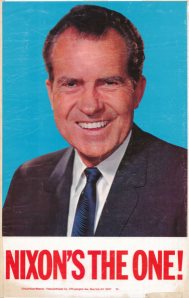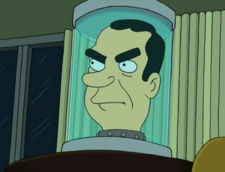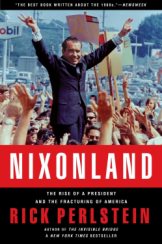 When I was two years old, my parents took me a photography studio to have my picture taken. This was in the days when a decent personal camera still cost a thousand bucks and the shopping mall photo studio hadn’t been invented yet (nor had the shopping mall, for that matter). So we went to some guy’s studio and he placed me in front of a blue wall and did his best to try to get me to smile.
When I was two years old, my parents took me a photography studio to have my picture taken. This was in the days when a decent personal camera still cost a thousand bucks and the shopping mall photo studio hadn’t been invented yet (nor had the shopping mall, for that matter). So we went to some guy’s studio and he placed me in front of a blue wall and did his best to try to get me to smile.
Unfortunately, this dude was a scary fucker, with bulbous eyes and yellow teeth. I cried. A lot. My parents stood behind the dude making increasingly desperate pleas for me to smile, and at some point I must have done so because I have the picture of myself, a curly-headed tike in red suspenders, smiling as if someone had just told me we could leave (which was probably the case).
There’s something weird about the picture though. One of the buttons on my suspenders is about twice the size of the other one, and also a different color. When I asked my mom about it she explained during the car ride on our way to the appointment one of the buttons had come off. Thinking quickly, my dad used a political booster’s button that he had taken from some volunteer and fastened it on me to keep my pants up. So if you take a magnifying glass and look closely at my baby picture, you can see that the button reads NIXON’S THE ONE.
It was the first and last time I ever voted Republican.
The same was true of a lot of people. My father is a lifelong Democrat, but I am pretty sure he voted for Richard Nixon. Lots of Democrats did. It was 1968, and Richard Nixon was making one of the greatest political comebacks in American history, second only to that made by F.D.R. after he was stricken with polio. A lot of Democrats were sick of the Vietnam War and completely unenthused about the their own candidate, Hubert Humphrey. With his old-style grit and determination, Nixon must have seemed like an oddly compelling choice—a kind of throw-back to the Belle Epoch of the 1950s, before the era of war protesters and race riots (not to mention sex, drugs, and rock-and-roll). Nixon had a surprising amount of support from young, educated voters like my father. Square kids who were sick of the madness of the 1960s and just wanted a return to normalcy.
Nixon won the election, of course. And six-years later, one of those same square kids—a young Republican newspaper reporter named Bob Woodward—would help unleash the scandal that drove him from office in disgrace. I grew up knowing more about Carl Bernstein and Bob Woodward than I ever did about Richard Nixon (and not just because they were played by Dustin Hoffman and Robert Redford in the movie).
So you can imagine my surprise when I recently heard my son, Connor, who is thirteen, doing a very credible impersonation of old Tricky Dick, complete with that half-growl-half-stammer style of vocal delivery that became his most lampoon-worthy trait. Hearing my son do this schtick, I thought to myself: What the hell?
Of course, Nixon was long a favorite targets of comedians, young and old. But that was ages ago. Where had Connor, a Twenty-First Century kid, picked it up?
Then I realized the answer. It was from Futurama, the animated comedy show, which is now streaming on Netflix and to which Connor is addicted. Nixon appears frequently on that show. Or, rather, his head does, preserved in a cryogenic jar. Whoever does his voice on the show has him nailed, and the jokes are quite good. In fact, Nixon’s head is one of the funniest characters on the show.
And this leads me to one of the strangest twists of fate in American history: Richard Nixon, physically dead since 1994 and politically dead since 1974, is still one of the most recognizable icons of the Twentieth Century. Moreover, in the past ten years, Nixon’s legacy has made a bizarre and totally unexpected comeback. At least one movie drama was made about him (the excellent Frost / Nixon) and one good comedy (Dick). Besides Futurama, he pops up on the Simpsons from time to time. And, of course, people are still writing books about him, the latest addition being Tim Weiner’s acclaimed One Man Against the World: The Tragedy of Richard Nixon.
As always, Richard Nixon somehow remains in the public eye. Not to mention our national psyche.
I can’t prove it, but I would guess that the only other political figure from that era who surpasses Nixon in face recognition is J.F.K. And this make perfect sense. Throughout his career, Nixon existed as a kind of mirror-image of Kennedy. Both vets of World War II, they started out in Congress at about the same time. They were both obsessed with foreign policy, history, and America’s place in the reconstructed world. They were even friends, right up to the moment when they faced-off against each other in the famous campaign of 1960.
 But while Kennedy was the pampered scion of one of the richest families in America, Nixon grew up in an atmosphere of crushing poverty. He liked to recount, mirthlessly, how oil was discovered in his father’s lemon grove after his father had just sold it. Kennedy was handsome, dashing, and charismatic. Nixon was dog-faced, plodding, and introverted. Kennedy shagged a lot of women. Nixon married his college sweetheart and never strayed.
But while Kennedy was the pampered scion of one of the richest families in America, Nixon grew up in an atmosphere of crushing poverty. He liked to recount, mirthlessly, how oil was discovered in his father’s lemon grove after his father had just sold it. Kennedy was handsome, dashing, and charismatic. Nixon was dog-faced, plodding, and introverted. Kennedy shagged a lot of women. Nixon married his college sweetheart and never strayed.
But the greatest inverse-parallel between the two men is the way in which their careers ended. Kennedy was murdered on TV, instantly becoming our greatest political martyr. Nixon was killed on TV, too, but only in the political sense. Both men were instantly mythologized. J.F.K. became our Henry V, a valiant young hero of the cold war. Nixon became our MacBeth, the dark usurper whose greed and paranoia ultimately destroyed him.
And so the current resurgence of Richard Nixon as a pop icon is perhaps not so surprising. We are always fascinated by the Dark Side of the Force. And Richard Nixon was exactly that—a man with many gifts, but also many demons.
What is really interesting, though, is that most of these recent satirical presentations have a tinge of nostalgia about them. Frost / Nixon is the best example. In that film, Nixon confesses his sins to the court of public opinion, and is thus redeemed. And on Futurama, Nixon becomes a kind of lovable old nut (albeit one encased in a jar).
Still, I suspect that most young people today know very little about the real Nixon. I remember him, but most of what I know I have learned from books, and from the stories told to me by my father and his friends. He was, by all accounts, a very intelligent and driven man, capable of great vision and decisiveness. His achievements as President were real and significant: the alliance with China, the ending of the Vietnam war, the Environmental Protection Agency, and the Clean Air and Water Act.
He was also a ruthless military leader who bombed the living crap out of a nation, Cambodia, with whom we were not at war. (Whether he was justified in doing so depends on who you ask.)
But above all else, Nixon has one singular, dubious distinction: he was the political figure who lead America closer to fascism that any other, before or since.
Yes, I dropped the F-bomb: fascism. The word is overused, I agree, but I use it deliberately here. In my admittedly simple understanding of the word, fascism simply means a repressive government that functions for the good of a few big-shots and their corporate cronies. And, by this brief definition, America in 1973 was well along the road.
Note that I do not claim that Richard Nixon was himself a fascist. In fact, I suspect that he was a decent man. But even if he wasn’t a fascist, his thugs most certainly were. Guys like H. R. Haldeman and Howard Hunt—the guys who paid the guys to break into the Watergate building. These were the enforcers whom Bernstein and Woodward eventually uncovered. (If they hadn’t, we would probably be living in a very different world.)
Most people under forty don’t understand this.
But even so, Nixon continues to fascinate and even beguile us as a nation. Not in the John Milton sense—Nixon was no Mephistopheles. Rather, he now represents the country’s first Super-Nerd. In the era just before the time when Nerds took over the world, Nixon was a prime example of the smart, bookish, awkward kid who just kept plugging away. Yes, he was brought down by his own tragic flaws, but that’s something modern nerds can relate to as well. (Steve Jobs, anyone?)
And so, in the end, I share my generation’s nostalgia and shrugging admiration for Richard Nixon. And even a bit of love.
And, yes, it appalls me.

Much of what you describe about Nixon never really went away. Think of Reagan, the Bushes, the current GOP presidential hopefuls. That’s the scariest part — and it’s all so far from being a joke.
So true. I wish some of the current crop were even half as smart as Tricky Dick.